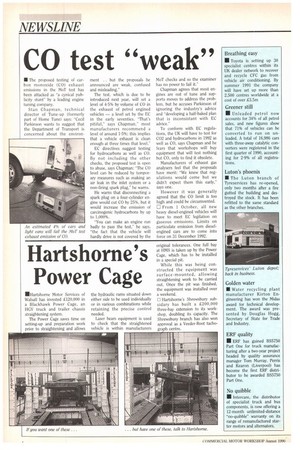CO test "weak"
Page 84

If you've noticed an error in this article please click here to report it so we can fix it.
• The proposed testing of carbon monoxide (CO) exhaust emissions in the MoT test has been attacked as "a cynical publicity stunt" by a leading engine tuning company.
Stan Chapman, technical director of Tune-up (formerly part of Home Tune) says: "Cecil Parkinson wants to suggest that the Department of Transport is concerned about the environ ment .. but the proposals he announced are weak, confused and misleading."
The test, which is due to be introduced next year, will set a level of 4.5% by volume of CO in the exhaust of petrol engined vehicles — a level set by the EC in the early seventies. "That's pitiful," says Chapman," most manufacturers recommend a level of around 1-5%; this implies that a vehicle exhaust is clean enough at three times that level," EC directives suggest testing for hydrocarbons as well as CO. By not including the other checks, the proposed test is open to abuse, says Chapman: "The CO level can be reduced by temporary measures such as making an air leak in the inlet system or a non-firing spark plug," he warns.
He warns that disconnecting a spark plug on a four-cylinder engine would cut CO by 25%, but it would increase the emission of carcinogenic hydrocarbons by up to 1,000%.
"You can make an engine run badly to pass the test," he says, "the fact that the vehicle will hardly drive is not covered by the MoT checks and so the examiner has no power to fail it."
Chapman agrees that most engines are out of tune and supports moves to address the problem, but he accuses Parkinson of ignoring the industry's advice and "developing a half-baked plan that is inconsistant with EC advice."
To conform with EC regulations, the UK will have to test for CO2 and hydrocarbons in 1992 as well as CO, says Chapman and he fears that workshops will buy equipment that will test nothing but CO, only to find it obsolete.
Manufacturers of exhaust gas analysers feel that the proposals have merit: "We knew that regulations would come but we didn't expect them this early," says one.
However it was generally agreed that the CO limit is too high and could be circumvented. 0 From 1 October, all new heavy diesel-engined vehicles will have to meet EC legilation on gaseous emissions. Limits on particulate emission from dieselengined cars are to come into force on 31 December 1992.












































































































